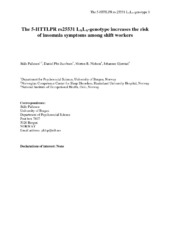| dc.contributor.author | Pallesen, Ståle | |
| dc.contributor.author | Jacobsen, Daniel Pitz | |
| dc.contributor.author | Nielsen, Morten Birkeland | |
| dc.contributor.author | Gjerstad, Johannes | |
| dc.date.accessioned | 2020-04-23T08:37:11Z | |
| dc.date.available | 2020-04-23T08:37:11Z | |
| dc.date.issued | 2019 | |
| dc.Published | Pallesen S, Jacobsen DP, Nielsen MB, Gjerstad J. The 5-HTTLPR rs25531 LALA-genotype increases the risk of insomnia symptoms among shift workers. Sleep Medicine. 2019;60:224-229 | eng |
| dc.identifier.issn | 1389-9457 | |
| dc.identifier.issn | 1878-5506 | |
| dc.identifier.uri | https://hdl.handle.net/1956/21980 | |
| dc.description.abstract | Background Previous studies indicate that shift work tolerance may be associated with individual factors including genetic variability in the gene encoding the serotonin transporter 5-HTT (SLC6A4). The present study aimed to explore the interaction between work schedule (shift work versus non-shift work), genetic variability in SLC6A4 and insomnia symptoms. Methods The study was based on a national probability sample survey of 987 Norwegian employees drawn from The Norwegian Central Employee Register by Statistics Norway. Insomnia symptoms were assessed by three items reflecting problems with sleep onset, sleep maintenance, and early morning awakenings. Genotyping concerning SLC6A4 (the 5-HTTLPR S versus L and the SNP rs25531 A versus G) was carried out using a combination of gel-electrophoresis and TaqMan assay. Results Using the LALA genotype as a reference a main effect of the SS genotype (B = 0.179; 95% CI = 0.027–0.330) was found. In addition, a main effect of work schedule (0 = non shift, 1 = shift work) was found (B = 0.504; 95% CI = 0.185–0.823). The genotype x work schedule interaction was significant for all genotypes; SLA (B = −0.590; 95% CI = −0.954–0.216), LALG (B = −0.879; 95% CI = −1.342–0.415), SLG (B = −0.705; 95% CI = −1.293–0.117) and SS (B = −0.773; 95% CI = −1.177–0.369) indicating higher insomnia symptom scores among LALA-participants compared to participants with other genotypes when working shifts. Conclusions The ability to cope with shift work is associated with the combination of the SLC6A4 variants 5-HTTLPR and SNP rs25531. Our findings demonstrated that the LALA-genotype increases the risk of insomnia symptoms among shift workers. | en_US |
| dc.language.iso | eng | eng |
| dc.publisher | Elsevier | eng |
| dc.rights | Attribution CC BY-NC-ND | eng |
| dc.rights.uri | http://creativecommons.org/licenses/by-nc-nd/4.0/ | eng |
| dc.title | The 5-HTTLPR rs25531 LALA-genotype increases the risk of insomnia symptoms among shift workers | eng |
| dc.type | Peer reviewed | |
| dc.type | Journal article | |
| dc.date.updated | 2020-01-17T21:00:45Z | |
| dc.description.version | acceptedVersion | |
| dc.rights.holder | Copyright 2019 Elsevier | eng |
| dc.identifier.doi | https://doi.org/10.1016/j.sleep.2019.04.009 | |
| dc.identifier.cristin | 1706676 | |
| dc.source.journal | Sleep Medicine | |

